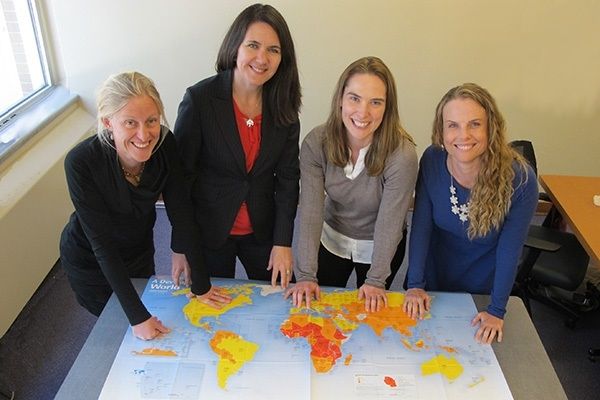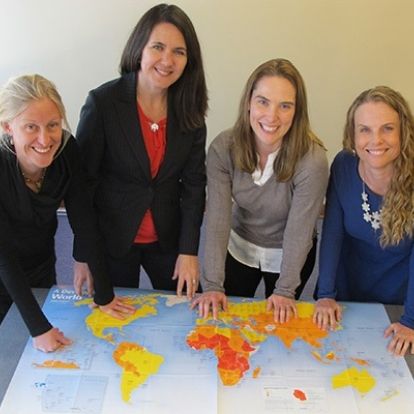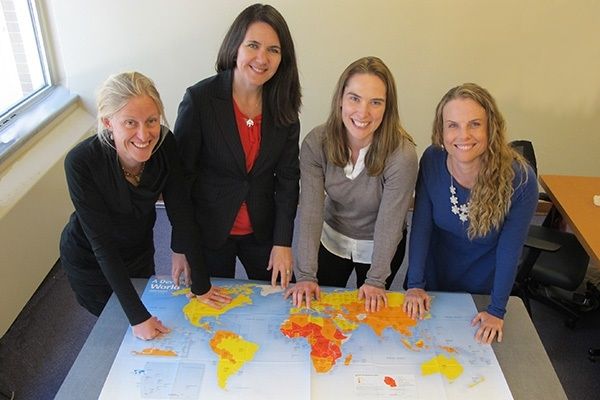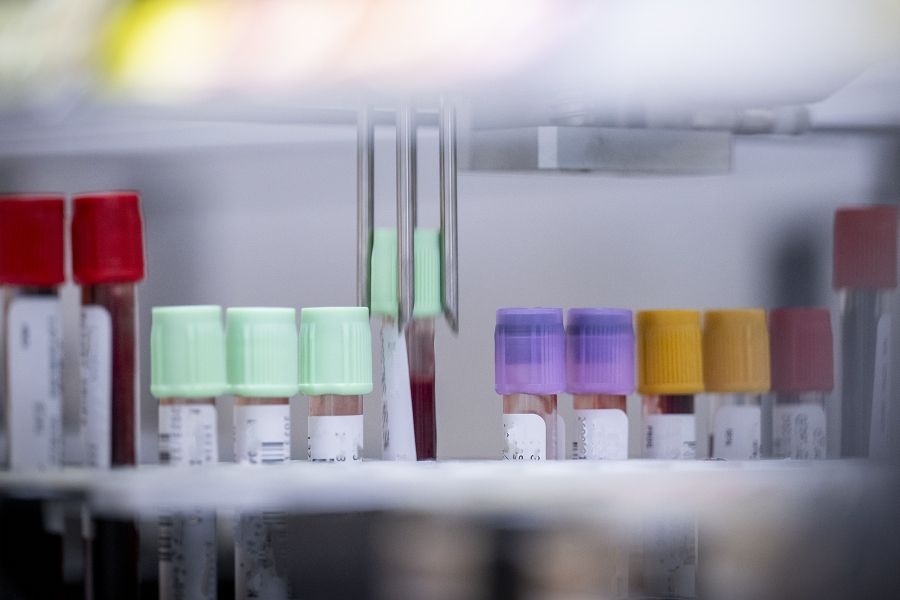
Four global health researchers at Queen’s University and Kingston General Hospital Research Institute are aiming to change the lives of some of the world’s poorest and most vulnerable populations, particularly mothers and children.
Co-leaders Heather Aldersey (School of Rehabilitation Therapy), Susan Bartels (Emergency Medicine), Colleen Davison (Public Health Sciences) and Eva Purkey (Family Medicine) have been awarded $449,000 from the Queen Elizabeth II Scholars Program (QES) to establish The Queen Elizabeth Scholars Network for Equity in Maternal and Child Health.
“Inequities in maternal and child health outcomes and access exist globally for certain groups, including those impacted by armed conflict, remote populations, displaced people, and people with disabilities. Unfortunately, these groups are rarely prioritized in research or policy,” says Dr. Aldersey.
Announced by the group today, the QES project is the first initiative of ARCH – A research collaborative for global health equity. This research collaboration will leverage their extensive experience working with partners in sub-Saharan Africa, Asia, the Americas and the Canadian North to look at such things as the impacts of war, poverty, natural disasters, socioeconomic change and preventable diseases on the lives and health outcomes of vulnerable families and communities.
“These researchers are at the forefront of global health research and innovation,” says Roger Deeley, Vice President of Health Sciences Research at KGH, and President of the KGH Research Institute. “Individually they’ve all demonstrated new ways to build healthier communities through, for example, novel uses of technology and better approaches to data-collection, and by building strong relationships with local health practitioners and community members.”
“This project, and the development of ARCH, enables them to share their extensive knowledge, experience and professional networks, as well as connect with colleagues in low- and middle-income countries. This QES funding specifically focuses on creating a network of researchers and practitioners equipped to address the factors leading to inequities in mother-child health and to interrupt the cycle of global poverty.”
The QES-Advanced Scholars funds will support the research, learning and advocacy skills of 15 students and early career researchers from specific low- and middle-income countries and Canada through a series of international exchanges. These new scholars will also take part in a common, multi-country study looking at the factors that contribute to maternal and child health inequities. Outreach activities will be central to the work in order to share and apply knowledge and create global linkages.
Maternal and child mortality and morbidity is still high in many parts of the world and among particular subgroups, even within Canada, the ARCH researchers point out. Internationally, it is estimated that six million children die every year before reaching the age of five. The maternal death rate in low- and middle-income countries is still 14 times higher than in developed regions.
“These are preventable outcomes, brought on by such factors as income disparities, lack of access to good quality services, and discrimination based on race, gender, and social class,” says ARCH researcher Susan Bartels.
“Our aim is to equip the next generation of maternal and child health researchers with the skills and knowledge to advocate for these vulnerable populations,” says Dr. Purkey.
In this project, they will be supporting doctoral, postdoctoral and early career researchers affiliated with Universities in low-resource settings including the University of Kinshasa in DRC; the Institute of Social Work and Social Science in Haiti, the Mongolian National University of Medical Sciences in Ulaanbaatar, as well as trainees at Queen’s University. QES researchers will be mentored during Canadian/international research placements.
“We hope to support and inspire global health researchers and to contribute to the evolution of Queen’s as a global health research leader,” says Dr. Davison.
The Canadian Queen Elizabeth II Diamond Jubilee Scholarships (QES) is managed through a unique partnership of Universities Canada, the Rideau Hall Foundation (RHF), Community Foundations of Canada (CFC) and Canadian universities. The QES-AS is made possible with financial support from IDRC and SSHRC.
Contacts:
John Pereira
Strategy Management and Communications
Kingston General Hospital
P: 549-6666 x 6875
E: @email
About the Principal Investigators:
Dr. Heather Aldersey has done research in community based rehabilitation, disability and family support in low- and middle-income country contexts, such as Bangladesh and the Democratic Republic of the Congo. She currently directs a 10-year project with Queen’s and University of Gondar to advance inclusive education for young people with disabilities in Ethiopia and Africa and a 5-year project on access to health and education for children and youth in Bangladesh.She is the faculty lead for the International Centre for the Advancement of Community Based Rehabilitation (ICACBR).
Dr. Susan Bartels works on the front lines of war and natural disasters around the world, documenting its effects on people and helping to improve the science and practice of delivering aid and treating the long-term impacts of these traumatic events. Her focus has been women and children in Sub-Saharan Africa and the Middle East and she currently has active research projects in Lebanon, Haiti and Vietnam. She is a clinican-scientist in the Department of Emergency Medicine and Director of the newly established Queen’s University International Emergency Medicine Fellowship.
Dr. Colleen Davison is a Social Epidemiologist and Population Health Researcher who studies child protection and the determinants of child health, particularly in remote communities. She is a CIHR- and SSHRC-funded researcher with long-term projects focusing on family- and community-level interventions for child health and community wellness in Mongolia and the Canadian Arctic.
Dr. Eva Purkey works with vulnerable populations in Canada and overseas, with an emphasis on women's health. She has worked with refugee populations on the Thai-Burmese border, with aboriginal populations in northern Canada, and with underserved populations in Kingston.
About ARCH:
ARCH at Queen’s University is a research collaborative for global health equity. ARCH researchers undertake research, capacity development and knowledge translation to improve health equity in Canada and internationally. Please reach out to any of the ARCH researchers to learn more.
Gallery


Drs. Eva Purkey, Colleen Davison, Heather Aldersey and Susan Bartels, co-PIs of the newly launched Queen Elizabeth Scholars Network for Equity in Maternal-Child Health



